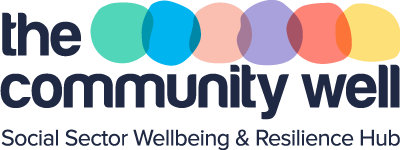ABOUT

The Community Well
The Social Sector Wellbeing and Resilience Hub - The Community Well for short - is an online resource specifically designed for charities, not-for-profit organisations and social enterprises.
It was developed because research shows that many leaders, staff and volunteers in the sector are experiencing stress, anxiety, overwhelm and burnout.
This ‘norm’ is simply not acceptable nor sustainable and this is our way of doing something practical to change it.
The Community Well aims to support good mental health in the social sector by building capability in wellbeing governance and practice. It curates trusted resources from respected organisations and showcases new resources, such as an Organisational Health Check, Workplace Wellbeing Strategy template and a Wellbeing Lens, to provide access to information and resources to take action.
We’ve called it The Community Well because we want it to be a place that you come back to, time and again – somewhere you know you’ll get what you need to enhance the wellbeing of yourself and your colleagues.
The site also addresses structural causes of the wellbeing deficit and flys the flag for better practice through advocacy. In this way we hope to mainstream better practice.
The site is the flagship project of Benefolk Foundation, an Australian charity whose mission is to support a strong and thriving social sector with resilience for the future. We are grateful for the support of the Lord Mayor’s Charitable Foundation through the Eldon and Anne Foote Trust.
MAKING THE MOST OF THIS SITE, IF YOU ARE ...
Frequently Asked Questions
When you say ‘wellbeing’, what do you mean?
Wellbeing is multi-dimensional and includes a state of positive mental health where each individual can realise their own potential, cope with the normal stresses of life, work productively and make a contribution to their community. This is based on the World Health Organization’s (WHO) Promoting mental health: concepts, emerging evidence, practice, Summary Report (p10, 12). The Hub focuses on workplace mental health and wellbeing.
What is ‘resilience’?
Resilience – or the ability to bounce back – is the capacity for recovery and adaptive behaviours that may follow an initial retreat or incapacity after stressful circumstances, including workplace stress1.
What do you define as the ‘social sector’?
When we say ‘social sector’, we mean all not-for-profit organisations, charities, community organisations and social enterprise staff, volunteers, boards, and leaders. It includes social, environmental and cultural issue areas and organisations of all sizes, including voluntary lead organisations. Peak bodies, membership bodies, educational bodies, grantmakers and intermediaries are included too, as they actively affect the sector through teaching and training, advocacy, funding, and influence. They watch out and wish well for the social sector.
Do we really need to address social sector wellbeing?
The 5 million plus people who work or volunteer in the social sector2 are well known for taking care of others. However, this compassion can come at a personal cost to mental health and wellbeing.
In 2020, Benefolk Foundation undertook two research studies (RESET 2020 National Impact + Need Research Study), involving more than 300 organisations. This was the first time Australia’s social sector workers were asked about their mental health and wellbeing.
The results were concerning:
- 45% of respondents often or always felt stressed or anxious.
- 41% felt frustrated, cynical or exhausted.
- More than 30% of respondents told us that they did not have expertise in, nor the resources to support their organisations’ mental health and wellbeing.
The research also uncovered data speaking to the pre-existing systemic challenges, with more than 80% of respondents saying that the growing burnout in the sector was an issue pre-pandemic, and that COVID-19 had exacerbated and put a spotlight on the systemic root causes of poor mental health outcomes for social sector professionals.
Our sector deals with many complex challenges that affect our health and wellbeing. For example, many organisations regularly have exposure to confronting issues such as homelessness, family violence, climate change and the impact of rolling natural disasters and the pandemic. In addition, there are several systemic factors that affect mental health and individual and organisational wellbeing, including funding uncertainty and difficulty building financial reserves that in turn affect high rates of employee turnover, workforce and talent shortages and HR time / cost. This puts more pressure on those that remain.
Many social sector organisations simply do not have the infrastructure, time or resources to call on in terms of looking after staff and volunteer wellbeing. Many don’t even know where to start! That’s why we created The Community Well.
While there are lots of great resources out there about how to manage staff and volunteer wellbeing, they are quite generic. They don’t take account of some of the things that make the social sector quite different to the corporate, small business and public sectors.
The Community Well curates resources and information that is relevant and specific to the unique circumstances facing the social sector and organises them into bite sized pieces which can be done step by step.
Is the site free for our organisation?
All the resources in The Community Well are free to access. This has been made possible through our government and philanthropic funding partners. Some resources such as the Organisational Health Check ask for a login to access which allows us to email you your report.
For organisations that would like further assistance we offer paid services. In the future we will be expanding these to include an Expert Bar for short, affordable video consults, online courses and trainings.
I’m a small organisation, is the site designed for us?
Yes. The resources on the site are designed for a range of organisations with employees and/or volunteers, including small ones. Legal responsibilities are relevant for all organisations while other resources raise awareness of best practice initiatives. The site provides a starting point to help identify what your organisation can do, in context of time, budget and resources, to support mental health and wellbeing.
I’m a team member, how can I use the site?
The Hub is available to everyone to access and that includes leaders, staff, volunteers and board members. Wellbeing impacts, and is influenced by, everyone in an organisation.
Most resources in the Prevent and Protect pillars are the responsibility of leaders but the best results come from working together constructively.
Sometimes it is employees or volunteer team members who raise ideas, provide input or offer to take the lead on wellbeing initiatives.
I’m a volunteer, how can I use the site?
Volunteers, whether on a board, in a support role or on the frontline, play a vital role in the sector and often have first-hand insight about the wellbeing challenges being faced on the ground. Volunteers might reference the site to stay on top of the organisation’s legal obligations or look at the role they play in supporting governance and destigmatising mental health. There’s also resources to guide volunteers to manage their own wellbeing and support colleagues if times get tough.
Wellbeing is not being addressed in my workplace, what can I do?
We suggest showing your leaders the why and wellbeing stats and if there are further issues or barriers, read here.
The word module is used – is this a study course?
No. Not a study course. The resources on this site provide a good starting point in each area. We hope this saves you time getting started, or if you are already underway, augment your existing resources. So no, this is not a course with modules
The best way to use the site is to take the Organisational Health Check and look at the confidential report you receive by email. Use this to find priority modules and work your way through them. You might like to start by creating a Wellbeing Strategy (plan on a page) and put some wellbeing governance processes in place.
I’m glad to see this site is happening, what can I do to help?
Thank you. Some great ways to help are to partner with us or connect and spread the word.



